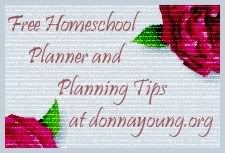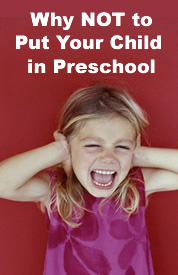Simplify the Curriculum, or “Colette’s List of 10 Things“ (with my own comments added):
1). Keep everything as simple as you can. Jesus wrote with a stick in the dirt, and He was the greatest teacher that ever lived. He used no curriculum or flannel graphs or lesson plans. Homeschooling can be made far more complicated than it should be. A simpler approach is much more effective.
Why do we make things so difficult for ourselves? Why do we feel we need to spend hundreds of dollars on curriculum, “educational toys”, manipulatives, etc to homeschool successfully? Why do we glue ourselves to one single method or curriculum?
Remember, there is no perfect curriculum. There is no special toy/manipulative or magical homeschooling method that will teach your children and solve all your problems. The truth is, we can make almost anything “work” as curriculum if we need to–in fact, before buying curriculum, it’s always a good idea to ask yourself if it is really necessary at all. Many topics can be taught naturally using real books and discussion.
The key to homeschool success is relationship–your relationship with your children; the time you spend working with them one-on-one; your ability to individualize your methods and curiculum; the time you spend reading aloud and then discussing what you’ve read. Relationship is more important than curriculum (or method.)
2). Stick to the 3 R’s. They form the foundation of life-long learning in every field because they are the tools of study. There will be no need to formalize any other subject if the children are doing their best in these 3, because people who are well grounded in reading, writing and math will approach other subjects boldly, independently and confidently.
I have to add Bible to that…I believe our most important subjects are Bible/Christian Character, math, and language arts. We should concentrate most of our time on these. Be sure to go for mastery, not just “exposure” in these subjects. I have a good friend who says, “If your child knows and loves the Lord, loves to learn, can read and write well, knows basic math, and knows how to do research –then what else does he need?” (Thanks, Peggy!)
Do you worry about “gaps”?! Things your children will miss? All children have “gaps”. You have them, too. There is simply too much to learn; no one can master it all. But if you love to learn and if you know how to do research, you will want to fill those gaps when they come up–and you’ll know how to do so. You will be a lifelong learner.
Don’t get me wrong; I do want my children to know science, history, geography, etc. We do teach those subjects in our homeschool. I also believe that art and music are important. But sometimes we overlook the fact that our children learn lots from real life, being read to and through independent reading. We make things harder than they need to be. If your children haven’t mastered the basics yet, try concentrating on mastering them for awhile. For your other subjects, read aloud to your children, and discuss what you’ve read. Also encourage your children to explore their own interests during their free time.
3). Let the children teach themselves as much as they are able to. This teaches them responsibility, intellectual independence, and builds confidence. It’s also better for the parent/child relationship because you can focus on parenting instead of playing schoolteacher.
I agree, and yet disagree with this one. I make it a rule not to do anything for my children that they can do for themselves; I encourage them to learn how to work “independently” in their chores and their schoolwork (more and more as they grow older.) But that doesn’t mean I expect to totally give up my role as “teacher-mom” and turn all learning over to my children. I think there has to be a balance of independent work and facitiated learning/discusion.
Sometimes in our haste to make things easier for ourselves, we turn too much over to our children too soon. To make the most of our homeschool, we need to maintain our involvement in our children’s school work. At the least, we should introduce new concepts and discuss them; introduce new assignments, communicating to our children exactly what is expected of them; supervise/check in on our children as they work; read aloud/discuss their learning; ask them to talk to you about what they’ve learned (or narrate–either verbally or through a report), and finally, inspect (check) their work immediately upon it’s completion. If we overlook these things, we miss out on the best parts of homeschooling and in my opinion, let our children down.
I must admit, I didn’t do the best job with this for my older set of children. I was so busy with my little ones that I entrusted them with too much independence too soon. I didn’t discern their true needs. Be careful to find a balance in your homeschool, so that you don’t repeat my mistakes. (Note: Plan to sit right with your children while they are doing their assignments for the first few years. Maturity comes before independence.)
4). Use the most direct method available. For reading, read. For writing, write, for math, do it, and for Bible, read it. Don’t fall for catchy curriculums or methods that are really just something else for you and your child to learn.
See my post, “Homeschooling Early Elementary…Keep it Simple”, HERE.
5). Don’t worry about your child’s age or grade. Just let him do the best he can each day. Children grow intellectually like they do physically: in spurts. Although we may have an audience of skeptical relatives, homeschooling is not a circus, and we refuse to train our children to do tricks for people.
Our goal should be to find out where our children are now, and then move them forward from there. Slow and steady wins the race! We tend to expect far too much of our younger children, and not nearly enough of our older children. Instead, duing the early elementary years, back off a bit and wait for readiness. Children in Sweeden and Switzerland don’t even start school until they are 7, and yet they outscore American children on standardized tests. (See my tab, “Readiness”, and my archived posts on readiness as well.)
6). Minimize distractions in the home. Watch for excessiveness in entertainments, snacking, outings, phone conversations and the like. These sorts of things can easily get out of hand and compete with the effectiveness of a homeschool and sap the family of time and energy.
Such distractions also get in the way of our children’s time to play, explore their hobbies/interests, and so on. These are vitally important to children of all ages. Distractions eat up our own time as well; especially the time we could be spend reading the Bible, playing games with our children, and giving them unrushed, real life experiences (cooking, nature walks, art, etc) they need.
7). Seek quality over quantity. A few tapes of great music, a small case of carefully chosen books, a few special play mates, and an occasional outing is better than a large, but poor quality collection.
Often we spend hundreds of dollars on these things–with the best of intentions–only to have them gathering dust on a shelf. Start with a few of the best, and use them. Once your children become familiar with the books and CD’s you have, you can add more. This saves you from stress and guilt…and it saves money, too. Sometimes I think we give ourselves so many options that we don’t know what to do; we’re like toddlers overwhelmed by a mountain of toys. Less really can be “more.” Believe me about this–I’ve learned it the hard way.
8). If you must document your school activities, do it after the fact. This way you will not make promises you cannot keep. If you are required to make lesson plans, be as vague as permissible. Don’t let transcripts, diplomas, records and tests determine your academic plans. Focus on learning and the rest will follow.
I don’t know about you, but I hate those “teacher plan” books…I dispise those empty boxes (even if I planned my day that way–i.e. alternating subjects.) This year we’re using a simple, journal-type planner. I added my own tabs to divide up the weeks, as well as tabs for writing down the books we read, resources we’re using, etc.
9). Put the needs of your youngest, most vulnerable children first. If an older child gets a little behind in school, I’m sure you can forgive yourself. But if something happened to the toddler while you were busy homeschooling, I don’t think you would be able to say the same.
Once we’ve given our youngest what they need, they will be content to let us work with our older children. See my tab on “Routine”, and my article, “Keeping Little Ones Busy.”
10). Love the Lord your God with all your heart, mind and soul and don’t neglect to seek him early…giving him the first fruits of your day and teach your children to do the same. I know that you are tired and that there aren’t enough hours in your day, but we serve a God who can make the sun stand still.
Examine yourself: Do you “make the main thing (JESUS!) the main thing” in your personal life/homeschool/family life? Do you spend time in the Word everyday? Does your life reflect your most important goals? Do you live out your faith? Does your life rotate around GOD, or your family/homeschool? (OUCH.) I know I have a long way to go regarding these matters…I’ve been very convicted lately about truly living out my most important goals.
For more about “the main thing”, see my post, “Challenge To Christian Parents.”
Live the 4R’s! ~~Susan
Info about this post: “Simplifying,” according to my information, this was orginally posted on the RC4JC Yahoo group and is used with permission: “Anyone can use Colette’s list of 10 things; she’d like it if they credit the e-group or her by name, but it’s otherwise free for use without any conditions.” (If this information is incorrect, please let me know so I can give credit where credit is due. I did my best to find the orginal source.)
Colette is one of the moderators of the Robinson Curriculum email group:
Robinson Users for Christ
Simplify the Curriculum © Colette Longo, used with permission. Other portions of this post: © 2010 Susan Lemons all rights reserved.





